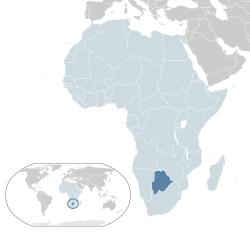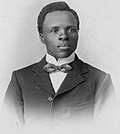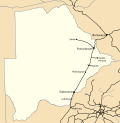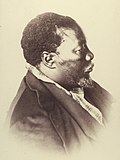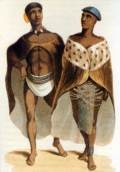Portal:Botswana
Intro
Botswana, officially the Republic of Botswana, is a landlocked country in Southern Africa. Botswana is topographically flat, with approximately 70% of its territory being a part of the Kalahari Desert. It is bordered by South Africa to the south and southeast, Namibia to the west and north, Zambia to the north, and Zimbabwe to the northeast. With a population of slightly over 2.4 million people and a comparable land area to France, Botswana is one of the most sparsely populated countries in the world. It is essentially the nation-state of the Tswana people, who constitute nearly 80% of the population. The Tswana ethnic group are descended mainly from Bantu-speaking peoples who migrated into southern Africa, including modern Botswana, in several waves before AD 600. In 1885, the British colonised the area and declared a protectorate named Bechuanaland. As part of the decolonisation of Africa, Bechuanaland became an independent Commonwealth republic under its current name on 30 September 1966. Since then, it has been a parliamentary republic with a consistent record of uninterrupted democratic elections, though dominated by the Botswana Democratic Party until 2024. As of 2024[update], Botswana is the least corrupt country in mainland Africa according to the Corruption Perceptions Index published by Transparency International. Botswana's economy has generally experienced stable growth since independence. It is dominated by tourism and mining; Botswana produces more diamonds than any other country. Its gross national income per capita (purchasing power parity) of about $20,158 as of 2024[update] (by some estimates the fourth-largest in Africa) gives the country a relatively high standard of living and the second-highest Human Development Index of continental Sub-Saharan Africa, after South Africa. Despite this, Botswana continues to grapple with high unemployment rates. Botswana is a member of the Southern African Customs Union, the Southern African Development Community, the Commonwealth of Nations and the United Nations. (Full article...)
Selected article -The San peoples (also Saan), or Bushmen, are the members of any of the indigenous hunter-gatherer cultures of southern Africa, and the oldest surviving cultures of the region. Some interpretations of the genetic analysis suggest divergence from other humans as early as 100,000 to 200,000 years ago. Their recent ancestral territories span Botswana, Namibia, Angola, Zambia, Zimbabwe, Lesotho, and South Africa. The San speak, or their ancestors spoke, languages of the Khoe, Tuu, and Kxʼa language families, and can be defined as a people only in contrast to neighboring pastoralists such as the Khoekhoe and descendants of more recent waves of immigration such as the Bantu, Europeans, and South Asians. (Full article...) Did you know - ... that in Botswana, writer Unity Dow (pictured) took legal actions as a plaintiff, legal counsellor, and judge to challenge gender discrimination and protect indigenous rights, before becoming a legislator? This is a good article, A-class article, featured list, or featured article, one of Wikipedia’s best work.
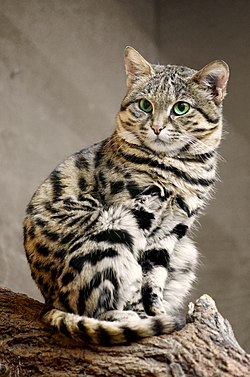 The black-footed cat (Felis nigripes), also called the small-spotted cat, is the smallest wild cat in Africa, having a head-and-body length of 35–52 cm (14–20 in). Despite its name, only the soles of its feet are black or dark brown. With its bold small spots and stripes on the tawny fur, it is well camouflaged, especially on moonlit nights. It bears black streaks running from the corners of the eyes along the cheeks, and its banded tail has a black tip. The first black-footed cat known to science was discovered in the northern Karoo of South Africa and described in 1824. It is endemic to the arid steppes and grassland savannas of Southern Africa. It was recorded in southern Botswana, but only a few authentic records exist in Namibia, in southern Angola and in southern Zimbabwe. Due to its restricted distribution, it has been listed as a vulnerable species on the IUCN Red List since 2002. The population is suspected to be declining due to poaching of prey species for human consumption as bushmeat, persecution, traffic accidents, and predation by herding dogs. (Full article...) General images -The following are images from various Botswana-related articles on Wikipedia.
Related portalsOther South African countriesReligion in BotswanaBotswana-related articlesCategoriesAssociated WikimediaThe following Wikimedia Foundation sister projects provide more on this subject:
| |||||||||||||||||



